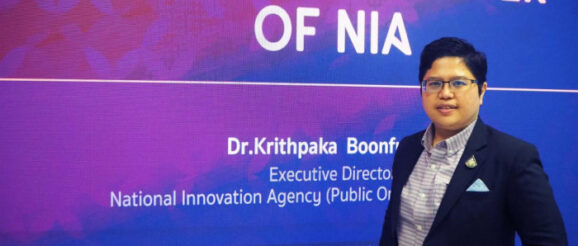New National Innovation Agency chief sets out plan for 4-year expansion in Thailand


The new chief of the National Innovation Agency (NIA) has outlined its goal to become a “focal conductor” by connecting all public and private partners, aiming to create 20 billion baht’s worth of economic impact and add 10,000 new innovation-based enterprises within four years.
The move will turn Thailand into an innovation nation and put the country into the top 30 global innovation index of the World Intellectual Property Organisation by 2030, said Krithpaka Boonfueng, the NIA’s third executive director, as she outlined her vison for 2024-2028.
“The NIA will change our role to become the focal conductor as one of the key players to drive innovation that collaborates with all partners to help innovation-based enterprises make an impact on the economy and society,” Ms Krithpaka said.
The organisation has evolved from its first two executive directors, who laid out its foundation and widened the alliance of innovation. Now at the focal conductor role, the agency will create seamless and deeper integration with all involved parties to drive and navigate innovations at a national level.
The NIA will achieve the goals through the concept of “create the dot, connect the dot, value creation” through the “groom, grant, growth” mechanism and the “2 reduce, 3 increase” approach, by promoting open innovations by listening to new ideas from startups and small and medium-sized enterprises to combat social and economic problems.
It will also focus on removing barriers to access and to leverage innovation for all sectors, along with revising regulations that could hinder growth, and increasing opportunities to access funding sources for both the public and private sectors. These will provide the opportunity to expand and create innovative Thai brands that are ready to compete with innovations from abroad.
Ms Krithpaka is concerned with the delay in the formation of the new government but believes that innovation is still the government’s key agenda, as pledged by all the major political parties’ election campaigns.
The NIA will be allocated a 1.2 billion baht budget in the 2024 fiscal year, of which 600 million baht will be for its granting and funding.
Moreover, Ms Krithpaka urged government procurement to use more local innovation-based enterprises, including startups.
The NIA will use seven strategies to foster the growth of Thai innovations. The first one is to create and upgrade innovation-based entrepreneurs (IBEs) in five targeted industries together with its networks. The five targeted industries are food-tech and agricultural-tech, travel-tech, medical-tech, climate-tech, and soft power.
She added that NIA aims to have 10,000 new IBE firms with 15,000-person workforces on top of 5,000 existing IBEs, as well as create an economic impact of 20 billion baht in these five targeted industries within four years.
The second strategy is the promotion of open innovations and to make the Thai innovation system more open, with open-wide funding and links to other sources of funds. The four-year goal is to achieve 2 billion baht’s worth of funds under its management and the provision of financial support to 1,500 projects.
Third, it will promote access and the utilisation of infrastructure with universities and science parks by working closely with regional science parks.
Fourth, it will be a centre for creating an ecosystem that promotes the utilisation of innovation, making policy recommendations and pushing for laws that support innovative businesses, including the Startup Act. The draft bill is being scrutinised by the Council of State and is expected to come into effect by next year.
Fifth, the NIA will also promote the marketing of innovations in the local and international markets and encourage major companies to support the business expansion of IBEs under the concept of a “Business Brotherhood”. It will also help the IBEs build up brands via e-commerce platforms and expand in both local and foreign markets. The targeted overseas markets are China, Japan, South Korea, France, Germany, Poland, Israel and the US.
Sixth, it will raise awareness and recognition of the importance of innovation through several activities and campaigns.
Seventh, the NIA will make its organisation ready to cope with the changes and promote the cross-functional operation.
